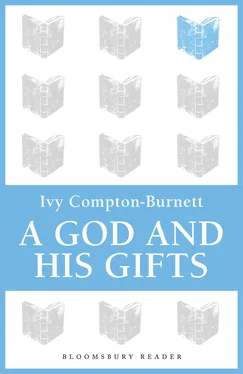“He has hardly been true to either. And does he not know his obligations?”
“He has fallen in with our wishes and given us his trust.”
“Through Hetty you mean?”
“It could be through no one else. But question me no further. I can say no more.”
“We want to do everything for the child ourselves,” said Ada. “So as to feel it is our own, and separate from our grandchildren. Doing all you can for someone is known to create a strong feeling.”
“Well, it is a way of putting what you want, into your life,” said Alfred, smiling. “And you might have a worse. You might indeed, my dear. It is a good scheme in some senses, a generous one in all. May all go well with it.”
“Well, I am glad to have an approving word from you at last, Father. I wondered if I should ever hear one again. I do think the scheme has things to recommend it, and things not quite to be despised. Aunt Penelope, you say nothing.”
“I say what your father said. As so often, our thought is the same. But I have a word of my own. What do Merton’s brothers feel about it?”
“They have given their approval. It means they will do their part.”
“It does,” said Salomon to Reuben. “What will it prove to be? What an odd and sudden change! And what light it throws on everyone! What light especially on Merton! I did not know he was a noble man, great enough to forgive.”
“Nor did I. I remember when he was strong enough not to have to.”
“It was a different stage of life,” said Sir Michael. “You have come to another.”
“I have not,” said Reuben. “I believe I should never forgive. And I am not sure that it is great. It seems to me rather humble.”
“It could be both,” said Ada. “There is humility in all greatness.”
“There are other things,” said Salomon. “Not always akin to humility.”
“Great people always know how little they have achieved,” said Joanna. “It does show how much they expected to.”
“It is time for us to leave you,” said Penelope. “We take away a great deal to think of.”
“And do not let Father think of it in the wrong way,” said Ada. “He will benefit much more, if he takes the right one. We are all going to benefit so much.”
“Are we?” said Reuben, as his elders followed the guests. “Or are there troubles ahead? The wise ones feared it.”
“We must avoid them,” said Salomon. “It will become an unwritten law.”
“What will become one?” said Hereward, glancing back.
“The avoidance of troubles arising from the new plan, Father.”
“It must become a law,” said Hereward, almost sternly. “And one that we never break. See that it is never broken.”
Galleon entered as Hereward went on, wearing a face so expressionless as to suggest control of it.
“Oh, you have heard, Galleon!” said Salomon. “Oh, we ought to have thought of it.”
“I did not hear, sir,” said Galleon, specifying no further.
“I did not mean you could help it.”
Galleon again did not hear.
“We know you will keep your own counsel.”
“It is best as I have said, sir.”
“You will forget anything you heard?”
“No, sir, it is best as I have said.”
“It is,” said Reuben. “We can only look up to you, Galleon. I suppose you look up to yourself.”
“Well, I have my share of self-respect, sir,” said Galleon, as he moved away.
“I can have none,” said Salomon. “I almost gossiped with a dependant about our private family affairs! I have no respect for myself, and I have lost Galleon’s. How his virtue has to be its own reward! When it is the only thing that deserves another.”
“We will follow his example and forget everything,” said Reuben. “But I feel we might be reminded.”
“Does Henry love Father?” said Hereward.
“No,” said his adopted son.
“Oh, Henry loves good, kind Father,” said Hereward, suggesting grounds for the feeling.
“No, Father love Henry,” said the son, using the name that had come about through his own rendering of Hereward.
“Oh, why must we only love you?”
“Because,” said Henry, looking at him with grave eyes.
“Don’t you love anyone else?”
“Father and Nurse,” said Henry, sitting up on Hereward’s knee. “Always very much.”
“Father does more for you than Nurse does.”
“No,” said Henry, surprised.
“When you are big, you will know it.”
“Big now; very big boy.”
“Yes, very big. You have lived nearly three years.”
“Five,” said Henry, erroneously. “Seven, five, eight.”
“You will be more than that one day.”
“A hundred,” said Henry, with force.
“Even Father is not as much as that.”
“Oh, no,” said Henry, compassionately.
“How old do you think Father is?”
Henry raised his eyes in silence, unequal to the demand.
“It was Father who brought you a toy to-day.”
“Broken,” said Henry. “Poor horse!”
“Oh, how did that happen?”
“Break it,” said Henry, illustrating the movement with his hands.
“Oh, that was not very wise.”
“Very good boy,” said Henry, in a precautionary tone.
“Let me see if I can do anything. Why, the horse is without a head.”
“No,” said Henry, putting the head and body together to remedy the position.
“You would not like your head to be apart from you.”
Henry broke into mirth at the idea, and took his head in his hands as if to safeguard it.
“So you did not like the horse?”
“Love it,” said Henry, stroking the head.
“You are not very kind to your toys.”
“Not put them away,” said Henry, in agreement.
“Not when Nurse tells you to?”
“She could spare herself the trouble,” said Henry, reproducing more than the words.
“She does not make you do it?”
“No good when they are young. A waste of breath.”
“Why, here is Mother coming. Show her how pleased you are to see her.”
“Always see Father.”
“Oh, you have the child, Hereward,” said Ada. “What a difference he makes to you!”
“Do you?” said Hereward, putting his face against the boy’s. “Ah, you make a difference.”
“One, two, three,” said Henry, as his grandparents and aunt appeared. “Poor Grandpa has a stick.”
“Yes, poor Grandpa,” said Sir Michael. “You would not like to walk with one.”
“Yes,” said Henry, holding out his hands.
“No, it is Grandpa’s stick.”
“No, Henry’s,” said Henry, getting off Hereward’s knee and advancing to the stick with open purpose.
Sir Michael gave it up, and Henry walked about the room, imitating his use of it, and appearing to find it an employment that could not pall. When he caught his foot and fell, he waited to be picked up and resumed it
“Give the stick to your big brother,” said Salomon.
“Not big,” said Henry, looking at him.
“Yes, we are bigger than you are.”
“Men,” said Henry, in a somehow baffled manner.
“You are right. We are not big for men.”
“No,” said Henry, smiling at the expression of his thought.
“What do you call your horse?” said Reuben, as Sir Michael retrieved the stick.
“Horse,” said Henry, surprised.
“But hasn’t it a name of its own?”
“Horse,” said Henry, after a pause.
“Isn’t its real name Dobbin ?”
“Yes,” said Henry, smiling again.
“And what does Dobbin call you?”
“ Sir ” said Henry, laconically.
“Does anyone call you that?”
“Yes, the coachman and his boy.”
Читать дальше












